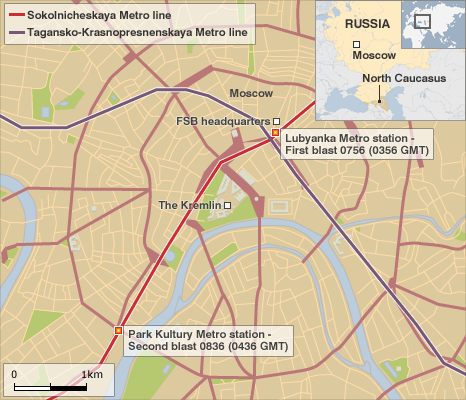The masterminds behind a double suicide bombing on the Moscow Metro will be destroyed, Russia’s leaders have said.
The attacks, in the morning rush hour, killed at least 38 people and injured more than 60, officials say. No group has said it carried out the attacks, but security services have blamed rebels from the North Caucasus – which includes Chechnya and Ingushetia.
President Dmitry Medvedev laid a wreath at the scene of one of the attacks, labelling the plotters “beasts”.
He said: “We will find and destroy them all.”
US President Barack Obama called President Medvedev to “personally convey” his condolences, adding that the US was ready to co-operate with Russia to help bring to justice those responsible for the blasts.
Russian Prime Minister Vladimir Putin had also earlier vowed to hunt down those responsible, saying: “Terrorists will be destroyed.”
He described the attacks, believed to have been carried out by female bombers, as “heinous”.
The Moscow city government declared Tuesday would be a day of mourning.
Past suicide bombings in Moscow have been carried out by – or blamed on – Islamist rebels fighting for independence from Russia in Chechnya.
A Chechen rebel leader recently promised to bring the war to Russia’s cities, months after Mr Medvedev declared an end to Moscow’s “anti-terrorism operations” in the mainly Muslim republic.
More than 100,000 people have been killed in 15 years of conflict in Chechnya and low-level insurgencies continue there and in the neighbouring republics of Ingushetia and Dagestan.
The first explosion tore through a carriage of a train at central Lubyanka station at 0756 (0356 GMT) as it stood waiting for commuters to board.
The station lies beneath the headquarters of the Federal Security Service (FSB).
“I was moving up on the escalator when I heard a loud bang, a blast,” an eyewitness named Alexei told Rossiya 24 TV channel.
“People started running, panicking, falling on each other.”
The second explosion, six stops away at Park Kultury, came at 0838 (0438 GMT). It hit the back of the train as people were getting on board.
“I was in the middle of the train when somewhere in the first or second carriage there was a loud blast. I felt the vibrations reverberate through my body,” one passenger told the RIA news agency.
The security services said the bomb that went off at Lubyanka station had an equivalent force of up to 4kg of TNT, while the bomb at Park Kultury was equivalent to 1.5-2kg of TNT.
The devices – believed to have been made with the powerful explosive hexogen, also known as RDX – were filled with chipped iron rods and screws for shrapnel.
The city’s Metro is one of the busiest underground railways in the world, carrying about 5.5 million passengers a day.
The system was partially disrupted following the attacks, but damage to the stations was minimal and both had reportedly reopened by the evening rush hour.
FSB chief Alexander Bortnikov said its investigators believed the attacks had been carried out by “terrorist groups related to the North Caucasus”.
“Fragments of the bodies of two female suicide bombers were found earlier at the scene of the incident and examinations show that these individuals came from the North Caucasus region,” he said.
The co-ordinated attacks were the deadliest in Moscow since February 2004, when 40 people were killed by a bomb on a packed metro train as it approached the Paveletskaya station.
Six months later, a suicide bomber blew herself up outside another station, killing 10 people. Both attacks were blamed on rebels from Chechnya.
